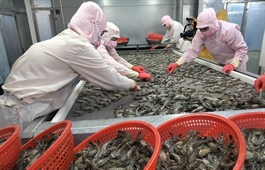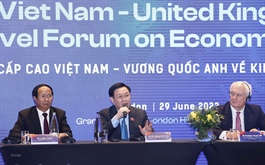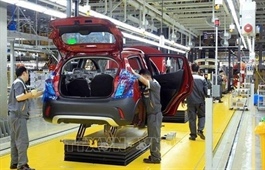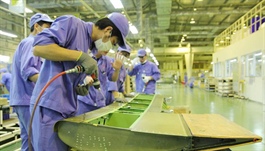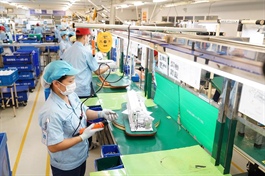Businesses get set for circular economy
Businesses get set for circular economy
Vietnam’s rapid economic growth has caused environmental challenges which have forced the nation to focus on fostering the development of a circular economy with less pollution and reused and recycled products.
Prime Minister Pham Minh Chinh, at his meetings with Vietnamese farmers and agricultural businesses a few weeks ago, cited the success of TH Group as a fine example of high-tech agricultural development, and the circular economic model being pursued by the government.
Famous for its TH true MILK brand, TH Group has been operating a $1.2 billion farm cluster project in the central province of Nghe An, featuring a state-of-the-art dairy cow farm and fresh milk production plant. The facility, which has a total annual capacity of 500,000 tonnes, hopes to quadruple the number of cattle to around 200,000 by 2025.
To save production costs, TH Group has been operating a state-of-the-art system of solar power panels on the roofs of the farm cluster, and the system has been connected with the national power grid. As of last year, power produced from the panels has met one-fifth of the farm’s electricity demand.
In 2019, TH Group began to use straws made from advanced bioplastics. This environmentally-friendly material is produced from plant materials such as maize, cassava, and sugarcane.
“These are good examples of high-tech agricultural development in Vietnam, and this must be expanded to many other enterprises,” said PM Chinh.
Experts say that a circular economy does not just involve efficient material recycling, but also involves enabling sustainable economic growth by optimising natural resource consumption, thus changing production chains and consumption models and redesigning industrial systems.
With Vietnam leaving its low-income past behind and now quickly becoming a middle-income country, the rapid economic growth is being clearly accompanied by increasing pressure on the environment.
According to the Ministry of Natural Resources and Environment (MoNRE), around 68,000 tonnes of solid waste are discharged on a daily basis by households nationwide, including 38,000 tonnes in urban areas, and 30,000 tonnes in rural areas. For urban solid waste, about 54-77 per cent contain organic substances, and about 8-18 per cent contain plastic and metal, which can be recycled.
Meanwhile, the volume of industrial solid waste discharged by factories in Vietnam is now 8.1 million tonnes per year, excluding 17 million tonnes of ash, slag, and gypsum discharged annually by thermal power plants, and chemical and fertiliser production plants.
“In this context, international experiences have proved that a circular economy – a relatively new concept in Vietnam – could be a good solution,” said Nguyen Quang Vinh, chairman of the Vietnam Business Council for Sustainable Development (VBCSD) under the Vietnam Chamber of Commerce and Industry, where he also acts as vice chairman. “Over past years, many nations have also pursued a model of circular economy for their more sustainable development.”
Increasing value
At UN and EU levels, the circular economy is being seen as a means of speeding up society’s move to a more resource-efficient system, thus improving competitiveness and responding to global environmental challenges.
The EU is known for having stricter environmental regulations than those in competing market areas. In 2015, the European Commission presented a circular economy package that aims for improved cost-efficiency, better balance of current accounts, increased self-sufficiency, new jobs and achieving climate targets.
The value of the circular economy in Europe alone is estimated at up to €570 million ($600.3 million) annually, according to Finland’s Ministry of the Environment and Climate Change.
Broad-based proposals contain incentives and reformed regulations to accelerate the circular economy, such as extensive commitments to eco-design, development of strategic approaches to plastics and chemicals, a major initiative to fund innovative projects under the umbrella of the EU’s Horizon 2020 research programme, and targeted actions in key focus areas including plastics, food waste, construction, critical raw materials, industrial and mining waste, consumption, and public procurement.
European nations like Finland are frontrunners in the circular economy arena, with innovative solutions coming from extensive collaboration among public and private sectors, which has also gained international attention thanks to its wide scope and pragmatic approach. Finland was the first country in the world to release a national circular economy road map, outlining the way to sustainable wellbeing and a successful carbon-neutral future.
Finland has set a goal to be a global circular economy leader by 2025. It is now implementing practical circular economy experiments providing benefits across all sectors of business and society.
Combining Finnish success in education and strong competences in digital solutions, Finland aims at offering unique solutions globally.
“Already a large number of world-class Finnish enterprises has adopted circular economy approaches in their business,” said Ernesto Hartikainen, senior lead of Carbon-neutral Circular Economy under Sitra or the Finnish Innovation Fund. “I think Vietnam, as I know is trying to develop its own circular economy, can seek experience from Finland and we stand ready to share our experience.”
Strong commitments
On June 16, the MoNRE’s Communication Centre for Environmental Resources (CCER) and some businesses in the aluminium can production and recycling chain, including TBC-BALL Vietnam, Lagom Vietnam JSC, and Thailand’s UACJ and Anglo Asia, signed an MoU on implementing a can-to-can closed recycling project, aiming to recycle used aluminium cans into new ones.
“The project is an interesting demonstration of the circular economy model, a strategy that can contribute to Vietnam’s implementation of its commitment to achieving net-zero emissions by 2050,” said CCER deputy director Vu Minh Ly.
The pilot project aims to collect 620 tonnes of used cans in a year, equivalent to 50 million used beverage cans in Ho Chi Minh City. Lagom Vietnam is handling the collection, whereby Lagom will begin to collect at restaurants before sending them to Anglo Asia Group in Thailand for processing. From there, UACJ will manufacture the aluminium can sheet and eventually send it to TBC-Ball Beverage Can to produce the next generation of aluminium beverage cans from the same metal.
Vietnam already has a large-scale packaging recycling collaboration, with TH Group teaming with eight other multinational companies and businesses in Packaging Recovery Organisation since 2019.
And since 2018, the VBCSD has been jointly implementing the Zero Waste to Nature initiative with Coca-Cola Vietnam, Dow Chemical Vietnam, and Unilever Vietnam. Zero Waste to Nature targets plastic waste in many localities such as Ho Chi Minh City, Hanoi, and Danang, with activities also covering sectors including steel, cement, and also textiles.








